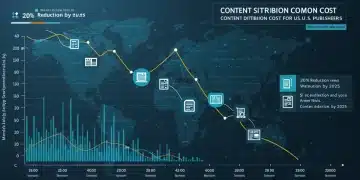Decentralized media platforms: a new era of content sharing

Decentralized media platforms empower users by providing greater control, creative freedom, and diverse content while facing challenges like misinformation and governance issues.
Decentralized media platforms are reshaping the landscape of content creation and distribution. These innovative technologies offer fresh opportunities while posing unique challenges. Have you considered how they might impact your online experience?
Understanding decentralized media platforms
Understanding decentralized media platforms is essential in our digital age. These platforms fundamentally change how we share and consume content, providing users with more control over their data and interactions.
Decentralization ensures that there is no single entity controlling the flow of information. This characteristic allows users to contribute and access content freely, leading to a more vibrant and varied media landscape. Imagine a world where you can post and share without excessive regulations or algorithms dictating your visibility.
The core features of decentralized media platforms
These platforms come with several unique characteristics that set them apart:
- Ownership: Users own their data and content, allowing for better privacy.
- Peer-to-peer sharing: Content is shared directly between users, reducing reliance on central servers.
- Enhanced freedom of speech: Without central control, users can express their views more freely.
- Community governance: Users often have a say in how platforms operate and evolve.
One of the fascinating aspects of decentralized media platforms is their ability to empower individuals. The creators can set their own rules for content, engage with their audience directly, and monetize their work without intermediary influencers taking a significant cut. This empowerment leads to a rich tapestry of voices and stories that might otherwise remain unheard.
Moreover, as these platforms gain popularity, traditional media companies are starting to adapt. They see the value in listening to their audience and being part of a more decentralized ecosystem. This adaptation could lead to improved content quality and more creative freedom for journalists and creators.
However, challenges remain. Issues such as copyright disputes and the spread of misinformation can arise when everyone has a platform. It’s crucial for users to approach decentralized media platforms with awareness and responsibility, ensuring that their contributions are valid and respectful.
As we delve deeper into this exciting realm, remember that understanding these platforms will empower you as a consumer and creator. Embrace the changes and explore how these platforms can enhance your digital experiences.
The rise and impact of decentralized platforms

The rise of decentralized platforms marks a significant shift in how we interact with media. This movement has gained momentum due to increasing concerns about privacy, censorship, and centralization in traditional media.
Many users are now seeking alternatives that allow them to have more control over their content and data, which has led to the proliferation of various decentralized platforms. This evolution of the digital ecosystem is not just about technology; it’s about redefining our roles as content creators and consumers.
The driving forces behind the rise
Several key factors have contributed to the growing popularity of decentralized platforms:
- Enhanced data privacy. Users feel safer when they retain ownership of their content.
- Increased freedom of expression. These platforms provide a space where voices can be heard without the fear of censorship.
- Community governance. Users participate in decision-making processes, fostering a sense of ownership and responsibility.
- Innovation in monetization. Creators can explore multiple ways to earn directly from their audience without intermediaries.
This rapid growth has not only empowered individuals but also influenced larger institutions. Traditional media companies are recognizing the need to adapt to these demands by embracing more decentralized practices. As a result, some are even experimenting with blockchain technology for content distribution.
Amid this transformation, the impact of decentralized platforms on social dynamics is noteworthy. Communities are forming around shared interests, leading to a more engaged and diverse online populace. Users are no longer passive consumers; they are active participants shaping the content landscape.
However, alongside these advancements, challenges remain. Issues such as misinformation and content moderation become increasingly complex in decentralized frameworks. It’s crucial for users to remain vigilant and take responsibility for the content they share and engage with.
As we observe the rise and impact of decentralized platforms, it’s clear that they are here to stay. Their ability to empower users, coupled with the shifting expectations from traditional media, suggests that we are in the midst of a communication revolution.
Benefits for content creators and consumers
The benefits of decentralized media platforms for both content creators and consumers are substantial. These platforms not only empower creators but also enhance the overall experience for users.
For content creators, one of the biggest advantages is the control they have over their work. Unlike traditional media, where publishers dictate terms, decentralized platforms allow creators to set their own rules for distribution and monetization. This means they can connect directly with their audience, leading to stronger relationships and feedback.
Key benefits for creators
- Higher earnings: Without intermediaries, creators can keep a larger share of their revenue.
- Creative freedom: Artists can express themselves without the restrictions often imposed by mainstream platforms.
- Direct audience engagement: Creators can communicate directly with their fans, fostering a loyal community.
- Ownership of content: They have full control over where and how their content is shared and monetized.
Consumers also reap numerous benefits from engaging with decentralized media platforms. These platforms offer users more options, allowing them to discover diverse content that might not be highlighted on mainstream sites. Users can participate in community decisions, helping shape the platforms according to their preferences.
Advantages for consumers
- Diverse content access: Users can discover niche topics and unique voices that aren’t prevalent elsewhere.
- Transparency: Many decentralized platforms provide transparency regarding how content is curated and displayed.
- Enhanced privacy: Users can enjoy a more private experience, as their data isn’t sold to advertisers.
- Community involvement: Consumers can take part in governance, influencing platform policies.
As we look at the landscape of decentralized media platforms, it’s clear that both creators and consumers stand to gain significantly. This synergy builds a more vibrant and diverse media ecosystem, where everyone has a stake in the content they engage with.
Challenges faced by decentralized media

Despite the many benefits of decentralized media, there are significant challenges that these platforms face. As the digital landscape evolves, understanding these challenges is crucial for users and creators alike.
One major issue is the spread of misinformation. On decentralized platforms, users often have the freedom to share any content they wish, which can lead to the circulation of false information. Unlike traditional media, where editorial oversight exists, decentralized platforms may struggle to ensure the accuracy of shared content.
Other key challenges include:
- Content moderation: Establishing fair guidelines for what constitutes acceptable content can be difficult.
- Security concerns: Users may be vulnerable to hacking or data breaches, which can compromise their privacy.
- Revenue generation: Finding sustainable monetization methods without relying on ads can be a challenge for these platforms.
- Fragmentation: With many platforms emerging, users can become overwhelmed when navigating their options.
Another significant challenge revolves around governance. Many decentralized platforms rely on community input for decision-making. While this can empower users, it can also lead to conflicts and disagreements about how the platform should evolve. This decentralized governance can sometimes cause indecision or slow progress in implementing new features.
As we consider these challenges, it’s important to recognize that addressing them is crucial for the long-term success of decentralized media platforms. Users and creators must work together to establish best practices that can mitigate these issues while fostering an environment of open communication and innovation.
FAQ – Frequently Asked Questions about Decentralized Media Platforms
What are decentralized media platforms?
Decentralized media platforms allow users to share and consume content without a central authority controlling the distribution, giving creators and consumers more control.
What are the main benefits for content creators?
Content creators enjoy higher earnings, creative freedom, direct engagement with their audience, and ownership of their content on decentralized platforms.
What challenges do decentralized platforms face?
Challenges include the spread of misinformation, security concerns, difficulties in content moderation, and governance issues among users.
How can users get involved in decentralized media platforms?
Users can participate by engaging with content, providing feedback, and taking part in community decision-making processes to help shape the platform’s future.





